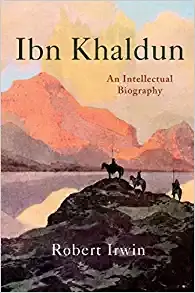|
Ibn Khaldun: An Intellectual Biography
By Robert Irwin Published in February 2018 272 Pages Thibault’s Score: 4/5 Ibn Khaldun: An Intellectual Biography is a study guide for Ibn Khaldun’s Muqaddimah. I find reading historical books to be very difficult, especially if they are more than a few centuries old. Even when translated in modern English, I often lack the necessary context to really understand many of the key points. This challenge is compounded when dealing with non-Western cultures that I am less familiar with, such as the Middle East. This book is a short study guide to the work of Ibn Khaldun. Irwin neatly summarizes Khaldun’s ideas, gives necessary historical context, and explains his possible influences. Writing this sort of book, and making it good, is extremely challenging. Usually, reading this kind of book is either an exercise in pedantic pseudo-intellectualism or is the equivalent of reading the phone book. Far too many of these books use hollow but vaguely intellectual sounding gobbledygook to make their books sound more profound. A good hint is when they talk about the “dimensionality” of a given topic or the “communicativeness of ideas.” Irwin makes none of the fatal sins that authors usually make when writing this sort of book. He avoids using all inflated language, instead choosing the path of conciseness and clarity. Ibn Khaldun was an endless source of ideas. He covered topics as diverse as the Kharijite revolution of North Africa, genie hunting in the deserts, and developed theories of taxation that are remarkably similar to those of 20th century economist Arthur Laffer. However, Ibn Khaldun is most well known for his concept of Asabiyyah. Asabiyyah is an Arabic word that doesn’t translate well into English. It has been alternatively translated with notions as diverse as “esprit de corps,” “ethnocentrism,” or “love for freedom.” None of these words succeed in capturing its essence. The core idea of Asabiyyah is that history is cyclical. He divides the world into two groups. One one side, there are tough desert people (Bedouins). These are either nomads or subsistence farmers. These bedouins develop simple pious religious ethics, a tradition of personal austerity, have group solidarity, have anti-state political ideologies / support small government, and are tough. These traits are collectively called Asabiyyah. On the other side, there are sedentary peoples living in cities. They lose their Asabiyyah - namely they discard religion, have profligate personal morals, have strong out-group preferences, want big government in order to compensate for their poor morals, and are generally weak. Over time, the powerful city-based nations and states decline. As the city dwellers lose their Asabiyyah, tough desert peoples come, and kill their political elites. The Bedouins become the new elites because they have more Asabiyyah. However, the city life corrupts the Bedouins. Over time, the Bedouins lose their Asabiyyah - coming to emulate the very city dwellers their forefathers defeated. This opens the gate for a new generation of tough nomads to replace them. There is some debate about the applicability of the theory of Asabiyyah. Some historians and commentators think that it only strictly applies to the desert tribes of North Africa. Others would take a more generalized interpretation, seeing non-desert peoples like the Germanic goths or Mongols following similar developmental paths. The book concludes with Irwin talking about how various different groups perceived Ibn Khaldun over time. Many Muslims initially rejected or ignored Ibn Khaldun, as Islam entered its internal dark ages around the time Europe entered the renaissance. Ibn Khaldun was rediscovered by the French when they colonized North Africa, and the French used Khaldun’s work to point out how backwards Islamic societies were. Later, Ibn Khaldun was rehabilitated, and new translations were made. These new translations used Ibn Khaldun to justify Arab nationalism, and the removal of the colonial authorities. Ibn Khaldun also influenced science fiction, with Frank Herbert’s Dune series explicitly modeled on Ibn Khaldun’s Muqaddimah. So do I recommend this book? Probably not, it's quite niche, and not of interest for most readers. But, if you are planning on reading the Muqaddimah or any other surviving fragmentary works by Ibn Khaldun, then it is the must read study guide. I wish other Medieval authors had study guides as good as this - especially with authors like Thomas of Aquinas or Paul the Deacon. Instead, it looks like I will be stuck with the fluffy pseudointellectual study guides when I read those books.
0 Comments
Leave a Reply. |
Thibault SerletMost of my articles are book reviews, but I also write about many other topics. Archives
December 2023
Categories |

 RSS Feed
RSS Feed